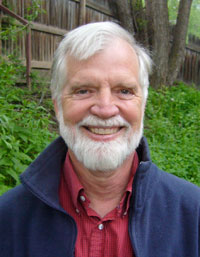Neurobiology and Clinical Research: an Alchemy of Useful Surprises
 May 20th, 2015Timothy B. Stokes, Ph.D.Private Practice, Boulder, Founder of Corporate Psychological Services, AuthorHost: Barry Erdman
May 20th, 2015Timothy B. Stokes, Ph.D.Private Practice, Boulder, Founder of Corporate Psychological Services, AuthorHost: Barry ErdmanAbout The Presentation
In his book, “What Freud Didn’t Know” (Rutgers University Press 2010), Dr. Stokes shows how neuroscience can serve to inform and simplify many things that are practiced in psychotherapy. The result is an effective tool for addressing obstacles to psychological wellbeing, which he calls the “Three Step Practice”. This has been well utilized by many people who have used the simple technique for improving their own happiness.
In this presentation, Stokes will describe another way of summarizing this research in neurobiology, identifying five principles that seem to underlie positive psychological change. Since the mind and the heart are the vehicles that allow us to develop spiritually, then one might imagine that Western approaches to working with the mind have relevance to spirituality. Indeed, Western neuroscience and psychology seem to offer a foundation for working with the mind that sheds light on helping us understand pathways to spiritual experiences. Dr. Stokes will draw upon his years of clinical practice and Buddhist meditation to suggest a graspable and practical understanding of “Where Western psychology ends, & Spirituality can begin: a Buddhist Perspective”.
If, as Jung suggested, alchemy was an early attempt to define a path of human psychological and spiritual development, then one recipe for today’s version might be described as “Into a beaker filled with primary discoveries in psychotherapy research, pour a distillate of clinically relevant neurobiological research, and see what precipitates out.” It is a form of modern alchemy: neurobiology informs clinical research, and the result is an unexpected and surprisingly simple set of principles that underlie much of what promotes positive psychological change. for example, these principles illuminate the underpinnings of EMDR, psychotherapeutic mindfulness practices, the value of emotional insight, and cognitive behavioral therapies. They suggest powerful, streamlined perspectives that inform how we aid clients and parishioners/congregants. They also provide a ground from which spiritual insights and practices can grow.
Program topics will include: The convergence of clinical and neurobiological research, 5 principles for positive psychological change, and Where Western psychology ends spirituality can begin: a Buddhist perspective.
About the Presenter
Dr. Stokes graduated from the University of Colorado in 1971, and received his Ph.D in Clinical Psychology in 1977 from the California School of Professional Psychology in San Diego, CA. Early in his career Dr. Stokes trained at various mental health milieus and taught at various colleges.
In 1980 he pioneered the Employee Assistance program for StorageTek Inc., a company that at that time had over 12,000 employees. Presently Dr. Stokes is the Clinical Director and owner of Corporate Psychological Services Inc., a company that has 24 affiliate clinical staff therapists. During its more than 30 year history, CPS has provide counseling services to approximately 200 employees and family members each year. CPS also offers educational seminars and management consulting services to its client companies and their employees.
Dr. Stokes has been in private practice in Boulder, Colorado, seeing adults and couples for more than three decades. He has received post-doctoral training in an eclectic array of modern treatment tools that include: various mindfulness practices; cognitive restructuring and schema therapy; EMDR; insight therapy modalities; exposure therapy and other behavioral therapeutic tools.
Dr. Stokes is best known for his book, What Freud Didn’t Know (Rutgers University Press, 2010). What Freud Didn’t Know is a very readable book, written for both clinicians and non-professional audiences. It explores the neurobiology that underlies positive psychological change, and lays down the foundations for amygdala script theory (see amygdalascripts.com, for more). It describes the basis for Dr. Stokes’ Three-Step Practice for mastering psychological problems and developing personal wellbeing. This easy-to-learn practice has become one of the mainstays for Dr. Stokes’ clinical work, and for the consultations he has provided to many other therapists.
With couples, Dr. Stokes introduces mindful communication strategies. He also is skilled in showing people how they can discover the various scripts that obstruct effective communication. When couples learn to recognize unproductive patterns of communication and what perpetuates them, the ground is set to master obstacles that arise in relationships, and to become more skillful and open to their partner’s difficulties. This shift allows the appreciation and love that partners feel for each other to grow again.
Dr. Stokes has been a Vajryanna Buddhist meditator for over 40 years. This, along with the good fortune of having learned from many very accomplished teachers, has served to shape Dr. Stokes’s understanding of the human mind.
His interests beyond psychotherapy include hiking, backpacking, dogs, and a longstanding Tibetan Buddhist meditation practice. He lives in the mountains outside of Boulder. Dr. Stokes is married, and has two grown boys.
Additional Resources
What Freud Didn’t Know by Tim Stokes Ph.D. Rutgers University press.
http://www.amygdalascripts.com/reviews
http://www.amygdalascripts.com/five-healing-insights
